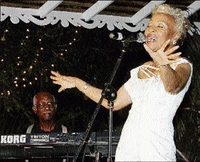Myrna Hague's authoritative display of beat and swing
Published: Sunday | April 19, 2009

Myrna Hague performs at Jazz in the Garden last year while husband Sonny Bradshaw looks on. - Colin Hamilton/Freelance Photographer
How distinctive her voice. Reigning jazz diva, Myrna Hague, has always stayed in touch with her roots. She performed recently at the Jamaica Pegasus Jazz in the Garden series as the featured vocalist with the Jamaica All Star Big Band. Not only did she radiate confidence onstage, knowing how completely animated she could become when enrapt inside the music, but confident in the precision of her style by the reassuring assent of her musical director and husband, Sonny Bradshaw, she went right to it.
She performed her short set with such elegance and vocal freedom that it seemed there was nothing else special about the evening but her singing. Looking in great shape, her grey hair, big eyes and elegant frame reflected a chic, stately radiance. This chanteuse with mic in hand was a model of creative refinement and professional discipline.
Delightful picture
On each of her numbers, she was swinging with effortless authority, displayed mastery of idiom, of timing and of nuance. With every phrase she uttered, a delightfully improvised feel emerged. She displayed an ability that drew attention to the dramatic potential of the simplest lyric. And the added enchantment was her snazzy onstage presence, which added a delightful picture to her singing.
She created dynamic music that served as a lesson to aspiring singers, sent notice to those who may have considered themselves her equal, offered an impression of the blues that affects jazz, and exhibited the form that is an aesthete's delight.
On Bob Marley's No Woman No Cry, for example, she displayed knowledge, so rich in indigenous traditions, which drew upon a deep innovative capacity to add an atmosphere of layered textures to her rendition of this reggae standard, turning it into a swinging jazz figure. Trite perennial crowd pleasers, The Way We Were and In Other Words (fly me to the moon), a lyric of youthful optimism, were both delivered with technical aplomb and creative reconfiguration that was so swinging that some of the audience members were out of their seats swirling. Only the absolutely talented, such as Ms Hague, can breathe fresh breath into such over-performed and, at this point, uninspiring tunes.
Her renderings were lapped up by the audience whose appetite for the familiar and mundane reflected the anticipation they had for the customary menu, from which to put together a Sunday dinner, which was included in the admission fee.
Irony and hushed remorse
But then, there are those songs that demand maturity and experience to fathom the tragedy and victory they contain. Ms Hague's take on Cole Porter's 1934 depression-era song about seduction, abandonment and revenge, a story of murder and lynching, Miss Otis Regrets, was conveyed with a sense of irony and hushed remorse.
She proved that by adding a twist of polite and nuanced attitude, without relying on vulgar obscenity, crudity and raw ordinary expression, musicians could artfully compose, lyrically address and sing sensitively and substantially about crude and offensive subjects without being distasteful. And her introduction of the very obscure If I Never Sing was a welcome addition to the shortlist of standards that circulate around the local scene. At the same time, it reflected how alone one can be in a crowd.
The hard swinging up-tempo Our Love is Here to Stay was the finale to Ms Hague's feature. On this venerable number, she displayed attention to the importance of beat, as such, her resplendently driving delivery had the audience swaying back and forth and tapping their feet. This songstress has devotedly preserved the luscious timbre and style of her hero, Sarah Vaughn, while infusing it with her own individuality and interpretative sensibility.
Of the evening's performers, Hague's presentation was compellingly artful; an achievement made more remarkable for the way her appealing stylistic aura attracted the audience's keen enthusiasm.
Herbie Miller is a cultural historian with specialised interest in slave culture, Caribbean identity and ethnomusicology. He can be contacted at herbimill@aol.com.
















